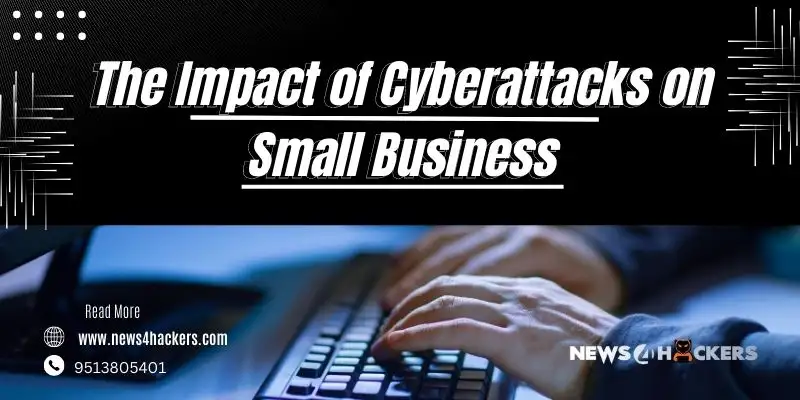The Impact of Cyberattacks on SMEs is Examined in “Small Businesses, Big Risks: Cyberattacks” Devastating Effects on SMEs

Due to the surge in only data storage for varied organizations regardless of the industry and genre of functionality, a vast majority of black hat hackers are bending towards Small and medium-sized enterprises (SMEs) that are increasingly becoming targets of cyberattacks.
To prevent our crucial datasets from becoming compromised in severe cyberattacks, we potentially require to identify the threat environment for SMEs.
Common Cyberattack Types that Target SMEs
Their corporate operations, financial stability, and reputation, may all suffer significantly as a result of these attacks. Moreover, there are several SMEs’ vulnerabilities in the area of cybersecurity that a cyber adversary can generally exploit to compromise highly crucial and sensitive datasets.
The following are some ways that cyberattacks might harm:
- Financial Loss
- Disruption of Business Operations
- Damage to Reputation
- Legal Issues
- Cybersecurity Costs
Cyberattacks’ financial impact on SMEs
Because they frequently have minimal resources, SMEs are immensely at risk of cyberattacks. Cybercriminals may obtain critical financial data, including credit card numbers, bank account information, and other financial records when they are targeted. Moreover, SMEs may suffer substantial losses in money as a result, particularly if they are unwilling to retrieve the funds that have been stolen.
Revenue and Business Losses
Cyberattacks can significantly reduce a company’s revenue and cause losses. When a company is the victim of a cyberattack, it may incur financial damages as a result of customer loss, interruption of corporate operations, and theft of critical financial data. In addition, the expense of restoring from a cyberattack might also be high because it may require investing in precautions against attacks and hiring cybersecurity professionals.
Moreover, a hack can also harm a company’s reputation, which could eventually affect its income. To prevent cyberattacks and minimize potential income and company losses, it is crucial for firms to put in place comprehensive cybersecurity measures.
Damage to Customer Trust and Reputation

The reputation and customer trust of a company might suffer significant harm from a cyberattack. Customers anticipate businesses to maintain the security of their financial and personal details. When a company goes down to a cyberattack, client data may be stolen, which could end up in identity theft and financial crime.
In this regard, customers can stop believing that the company is able to safeguard their data, which could affect sales and customer loyalty. Additionally, word of a cyberattack can travel quickly, harming the company’s brand and making it challenging to repair.
As a result, it’s critical for companies to act proactively to safeguard customer data and restore trust following a cyberattack.
Best Practices and Strategies for SMEs in Cybersecurity
Defending SMEs from Cyberattacks requires a comprehensive approach that includes both technical and non-technical measures. Here are some effective strategies for defending SMEs from cyberattacks, such as the following:
- Regular employee cybersecurity training,
- Implementing robust access controls,
- Regular software updates and patch management,
- Regular vulnerability assessments,
- Data backup and recovery planning,
- Engaging a cybersecurity expert, etc.
Purchasing Cybersecurity Services and Tools
Purchasing cybersecurity services and tools is crucial to protecting oneself from cyberattacks. Nevertheless, it can be difficult to choose the cybersecurity products and services that are most appropriate to a company’s requirements, given the abundance of options available.
The following are some elements that SMEs should take into account before purchasing cybersecurity services and tools:
- Budget
- Cybersecurity needs
- Reputation and reviews
- Compatibility
- Customer support
The Role of Industry and Government in Supporting SMEs
It is crucial for businesses and governments to assist SMEs in protecting themselves from cyberattacks. Trade organizations and industry associations can give SMEs access to cybersecurity resources, including training courses, best practices, and advice. In addition, they can help SMEs collaborate so that they can exchange cybersecurity expertise and knowledge.
Moreover, governments may help SMEs by sponsoring cybersecurity efforts, supporting cybersecurity awareness campaigns, and establishing rules that provide incentives for SMEs to adopt effective cybersecurity safeguards.
Furthermore, small and medium-sized enterprises and government organizations can work together to create cybersecurity standards that meet their particular business requirements. Industry and government can assist SMEs in defending against cyberattacks and reducing the potential financial, reputational, and operational damages brought on by cyber disasters by working together.
Industry Collaborations and Cybersecurity Support
Collaborations amongst industries are essential to SMEs’ (small and medium-sized enterprises) support of cybersecurity. SMEs can benefit from industry partners working together to remain current on the most recent cybersecurity threats and best practices.
Moreover, these partnerships also allow SMEs to collaborate on their resources and expertise, which makes it simpler to adopt successful cybersecurity measures.
As an example, industry partnerships can give SMEs cheaper access to cybersecurity products and services. In addition, industry partnerships may assist SMEs in navigating the complicated web of cybersecurity laws and compliance standards. Industry partners can help SMEs protect against cyberattacks and advance a more secure and robust cybersecurity ecosystem by working together.
Kindly read another article:
Adversaries Compromised ICICI Banks’ Confidential Data in a Cyber Attack
Adversaries Duped Cosmos Bank Customers of ₹94 Crores in a Cyber Fraud Case.







